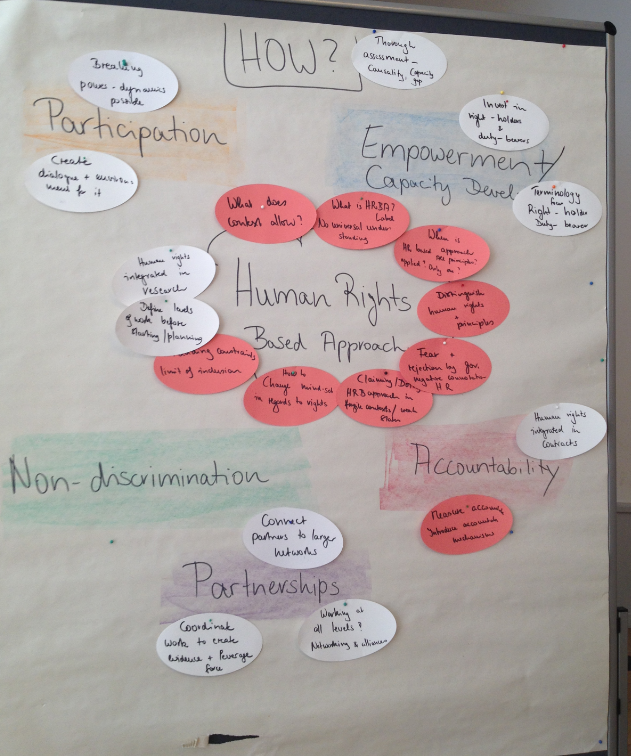- Austausch & Vernetzung
- Wissen & Lernen
- Advocacy
- Unsere Themen
Von Angela Bommer
A workshop held during the annual MMS/aidsfocus conference in May 2016 discussed how the principles of human rights based approaches such as participation, empowerment, partnerships and accountability are best applied to programming, what are the challenges and lessons learned.

In this workshop it has been discussed how Swiss NGOs and their partner organizations best apply Human Rights Based Approaches and principles such as participation, empowerment, partnerships, non-discrimination and accountability to programming. The principles as such are well-known for more than a decade and most NGOs consider them as an integral part to programming. Consequently the question arose: Is the human rights based approach (HRBA) only a new label for something that has been done for decades? How do we define HRBA? Which conceptual framework is applicable for NGOs? How does a HRBA work in a fragile context? And what is the added value to apply HRBA to programming?
Due to a lack of a common understanding or a uniform definition of HRBA it is a challenge to discuss how HRBA to programming can be best applied. To date, there is no universal conceptual framework which is applied by Swiss NGOs. Similarly on international level, institutions such as UNICEF or UNFPA have their own conceptual frameworks and it is disputable whether those would also apply for NGOs. However, even UNICEF or UNFPA are challenged by a lack of a common institutional understanding on how HRBA is defined and how their conceptual frameworks are implemented in practice.
Even though there is a consensus that all principles of HRBA such as participation, empowerment, partnerships, accountability and non-discrimination should be part of every programme and should be implemented at every stage of the project cycle, the reality looks a little different. Many NGOs still face challenges to apply all the principles fully within one project/programme. Often due to lack of time, the principle of participation has been cut short or the linkage between civil society organizations with national or international networks is difficult to make. Especially the principle of accountability is often not applied properly, as it is not always clear who is accountable to whom and often beneficiaries cannot hold the NGOs or local partners accountable for their work.
Yes, the change of mindset is important and a more comprehensive assessment of the legal context and how human rights are implemented is needed and holding governments or other actors accountable for not executing human rights is essential. Regarding the added value of a HRBA a study conducted by the WHO in 2013 (pdf) was cited, which shows that, in all four study countries (Nepal, Malawi, Italy and Brazil), human rights have, to one degree or another, explicitly shaped the laws, policies, programs and other interventions related to women’s and children’s health. This underlines the importance to strengthen advocacy on national and international level. UNFPA also switched the mode from providing services into working on accountability/advocacy and policy level, as those approaches seem to be more cost-effective.
As there is no universal understanding of HRBA, the conclusion of the workshop was that there is a need to create a common understanding among the different actors. As a first step to create a common understanding among the MMS members, it was suggested to establish a working group to share their best and worse practices and get trained on how to best apply HRBA to programming. Another innovative approach to better integrate HRBA to programming has been to integrate it into project/programme contracts with partner organization or Memorandum of Understandings with governmental institutions. For sure more research is needed on how HRBA can be best applied from an NGO perspective, but even more important will be practical training and capacity building on the principles and the application of HRBA for NGOs and their partner organizations. Having enough capacity, the inclusion of a local/national human rights assessments as part of every programme and project will be a first step on how best to apply HRBA to programming.